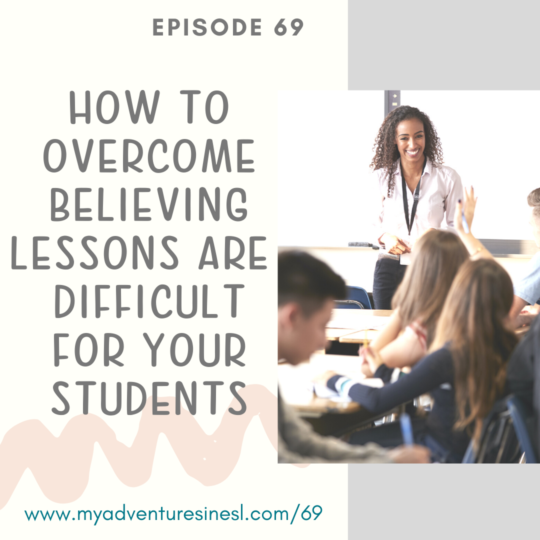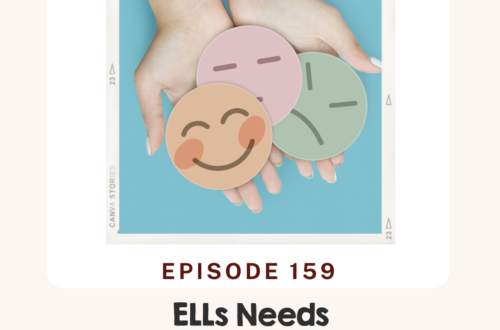
What if the lessons aren’t too difficult?
Would you like to download a copy of this episode’s transcript? Simply click here for the download.
We will be starting off this blog post with a reflection. You might have figured this out by now, but I love reflecting. It is essential for your growth as an educator. I would like you to take five minutes and reflect. This can have a huge impact on your teaching.
Here is our weekly reflection question: Are you exposing your Language Learners to engaging and rigorous lessons?
As a coach, mentor, and an ESL teacher, I hear this simple phrase from teachers frequently. Way more than I would like to hear it if I am being transparent with you. Teachers get a lesson and then say, “I am not going to do this lesson because it is too hard for my students.” I know this is a touchy topic, but I feel as if it needs to be addressed. Saying that you are not going to do a lesson, because it is “too hard” denies your Language Learners an opportunity. It denies them the opportunity to possibly learn about STEM, new engaging topics, exposure to new academic vocabulary, and so much more.
I will be sharing two personal stores in this blog post. First from the perspective of an educator who has said this to myself. Second, from the perspective of an educator who has stepped out of this mindset and hears it regularly from other educators.
When I first started teaching Language Learners, I was under this weird impression that everything has to be super easy for them. I was providing my intermediate students with traceable letters, coloring sheets, and easy printable worksheets. I was actually sitting this in front of them and calling it a lesson.
Thinking back on this I was bringing in my biases that since they were learning a new language I have to make it easy for them. I was also not truly comfortable teaching rigorous lessons. If you are a new teacher and wondering what is a rigorous lesson or simply need a refresher here is my personal definition. Rigorous lessons are lessons where students think critically, reflect, and where you are holding high expectations for your students. Simply providing my students who had great handwriting a tracing worksheet is not rigorous.
Then there is the lingering, uncomfortable question…..”Do I really know how to teach this to my Language Learners?” This required me to get vulnerable. I was masking this question by providing the students with activities that were easy for me to teach. In short, I wasn’t providing rigorous lessons.
From a perspective of a curriculum writer who sells resources to teachers this is by far the BIGGEST objection that I get about my products. “This is too difficult for my class.” Keep in mind the products include visuals, scaffolds such as sentence frames, graphic organizers, leveled text, and audio. However, I still get the objection that it is too difficult. My coaching instinct always kicks in, but I can’t help but wonder if they had the same mindset block that I had at the beginning of my teaching career. They see the text and the writing and automatically assume that it is too difficult.
I realized that after reflecting, getting feedback on my observations, and being very respectfully called out by some of my colleagues that I needed to change. I immediately started stepping and taking chances. One of the most profound changes was embracing a new and rigorous curriculum adopted by our school district. At first my mind was running and wondering about how in the world am I going to teach a novel to my newcomers. Instead of me saying this is too difficult for my newcomers, I started to attend professional development. I took the time to read books on how to teach reading to students. I was also very open to coaching. When my ESL coach visited, she provided me with strategies I could implement. For example, she was really big on breaking down the text and chunking.
I want you all to take a deep look at your teaching practices. Reflect every day and ask yourself those same uncomfortable questions that I asked myself. Do the behind the scene work of doing some deep soul searching as an educator. Then take the steps to grow as an educator. This can look like coaching, attending additional professional developments, and reflecting.
Your next steps are simple. Find five minutes today and reflect on your teaching practices. If you need help or would like to take my free course on reflection, click the link below. The course is “Reflect & Refresh”. It takes you through reflection questions, and provides strategies for you to refresh your teaching practices for this semester. Join the FREE course Reflect & Refresh: https://courses.myadventuresinesl.com/courses/reflect-refresh
How do you plan to reflect and refresh in the upcoming weeks? Share your comments and thoughts below.




